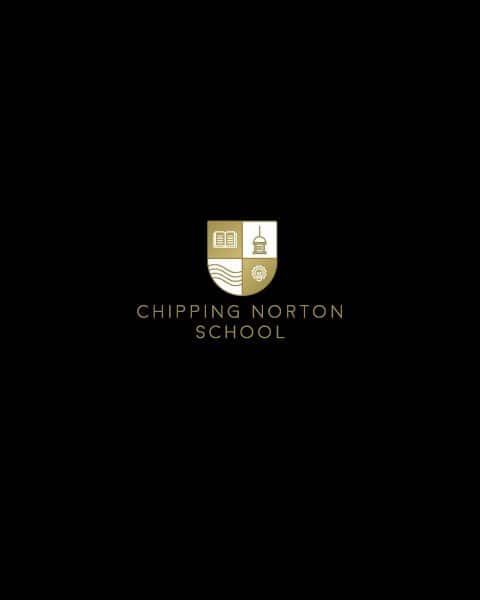KS3 and KS4: Personal Scorecard and Standards Report
During the academic year, students will receive three personal scorecards and three standards report – at the end of the autumn, spring and summer terms. All students will also receive two academic reports each school year, which provide an indication of the progress being made in each subject.
The personal scorecard and standards report are issued at the same time. They provide information on a student’s readiness to learn and their commitment to meet our very high expectations. This will include information on:
- Attendance and punctuality
- Quality of classwork
- Quality of homework
- Achievement (House) points
- Uniform and appearance
Each of these five categories are scored out of a possible 10 points: 10 for Gold, 5 for Silver and 3 for Bronze.
Tutors and subject teachers work together to generate your score: the lowest possible score is 15 and the highest is 50. Your combined score determines whether you receive an overall Gold, Silver or Bronze Award.
Here is an example of a personal scorecard
(Please note the students on these reports are fictitious)

Rupert has scored a Gold Award for the quality of his classwork which has earned him 10 points.
Rupert has scored a Gold Award for the quality of his classwork which has earned him 10 points.
Rupert has scored Silver Awards for: the quality of homework; achievement (house) points; and uniform and appearance. This has earned him 15 points (3 x 5 points).
Rupert has scored a Gold Award for the quality of his classwork which has earned him 10 points
Rupert has scored a Bronze Award for his attendance and punctuality which has earned him 3 points
Rupert has scored Silver Awards for: the quality of homework; achievement (house) points; and uniform and appearance. This has earned him 15 points (3 x 5 points).
Rupert has a total of 28 points (10+15+3). Overall, this is a SILVER Award.
Alongside the Personal Scorecard, students will also receive a Standards Report. This indicates student progress in individual subjects, in terms of the quality of their classwork and homewor. If a student is making progress and meeting their potential, then subject teachers will not express a concern or request to have a follow up conversation. However, if a teacher has a concern then they will indicate and request contact with parents and carers to address the issue/s.
Where there are concerns across a range of subjects then contact will also be made by the respective head of year to examine why the student appears to be struggling more generally, rather than in one or two particular subjects.
Here is an example of a standards report:

In this example, Rupert is not meeting the classwork or homework expectations in mathematics or design & technology. Mrs Avery and Mr Newton feel communication is needed with home to help get the (fictitious) student back on track.
In this example, Rupert is not meeting the classwork or homework expectations in mathematics or design & technology. Mrs Avery and Mr Newton feel communication is needed with home to help get the (fictitious) student back on track.
KS3 Academic Reports
Our teaching and learning framework champions a strategy of comparative modelling. This means that, before being asked to produce a piece of work, students will nearly always be shown ‘what a good one looks like’ and ‘how to make it great’. Two sets of criteria assist student clarity helping them to aim for an outcome that is ‘good enough’ (what we call ‘Secure’) and something that is ‘even better’ (what we call ‘Excellent’).

An example of Comparative Modelling as used in lessons by our Art Department. We show ‘Secure’ models and explore what makes them good…
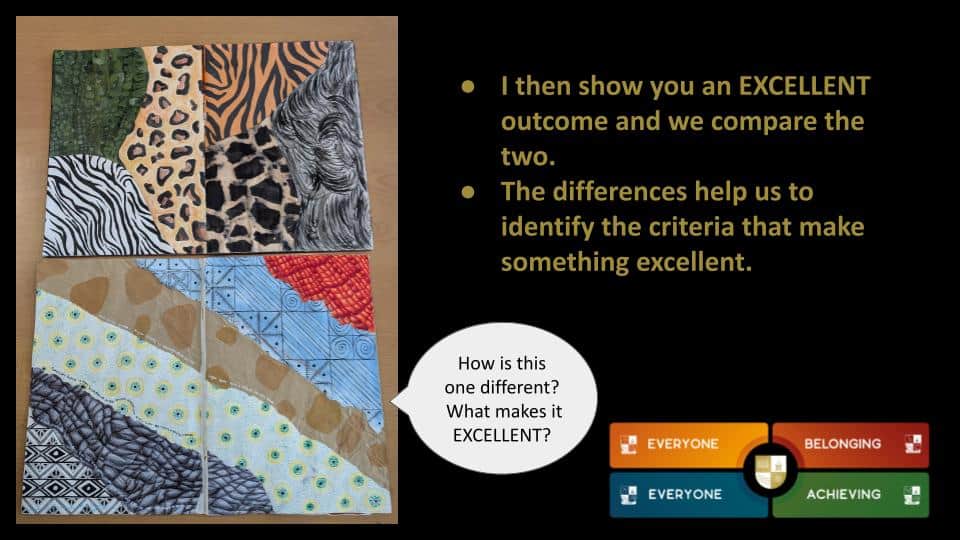
…and we show ‘Excellent’ models so that we can compare and then identify the differences that make an outcome great.
Assessment at Key Stage 3 is linked to this teaching and learning strategy. The words ‘Secure’ and ‘Excellent’ are used throughout the school in all Key Stages. At GCSE, the phrasing becomes tied to eventual outcomes with ‘Secure’ a shorthand for grades 4 & 5 (grades commonly recognised as a ‘pass’ or a ‘good pass’) and ‘Excellent’ a shorthand for grades 7, 8 or 9.
Summative assessments take place in all subject areas, often at the end-of-units of work and often coinciding with the end of a half or full term. When work is returned to students they are given one of four grades:
| Approaching Secure | Secure | Approaching Excellent | Excellent |
|---|---|---|---|
| (AS) | (S) | (AE) | (E) |
| This means that the assessment has come close to achieving the ‘secure’ criteria for this assessment. | This means that the assessment has met the ‘secure’ criteria for this assessment. | This means that the assessment has come close to achieving the ‘excellent’ criteria for this assessment. | This means that the assessment has met the ‘excellent’ criteria for this assessment. |
| Approximately 20% of the year group will achieve this grade in any cohort-wide assessment. | Approximately 50% of the year group will achieve one of these two grades in any cohort-wide assessment. | Approximately 30% of the year group will achieve this grade in any cohort-wide assessment. | |
As you can see, the spread of grades awarded will roughly echo our average expected outcomes of the cohort when they will eventually sit their GCSEs.
The language we use when assessing student work is aspirational with outcomes closely linked to success criteria. These in turn are used by teachers to draw attention to what needs to happen in order for students to improve.
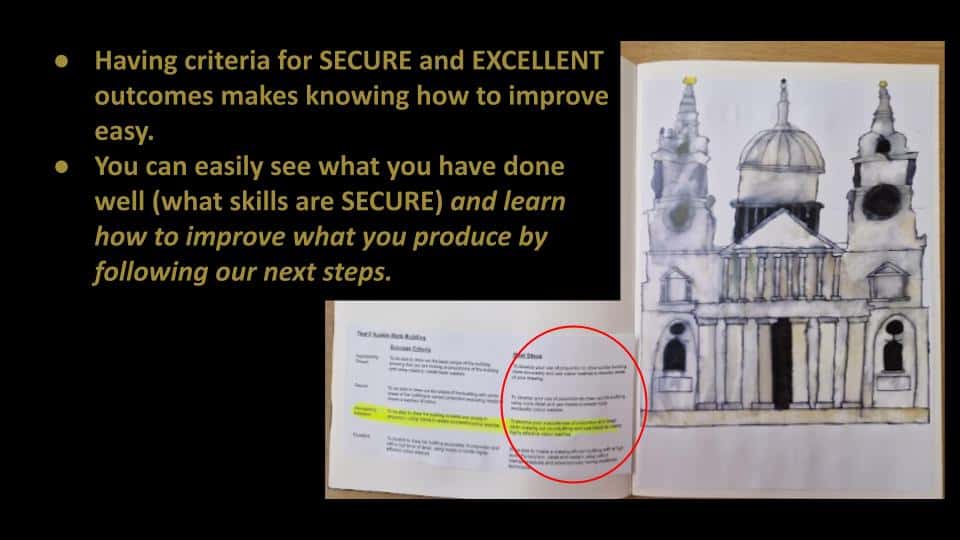
Students are able to see how their work has met the assessment criteria explored in class.
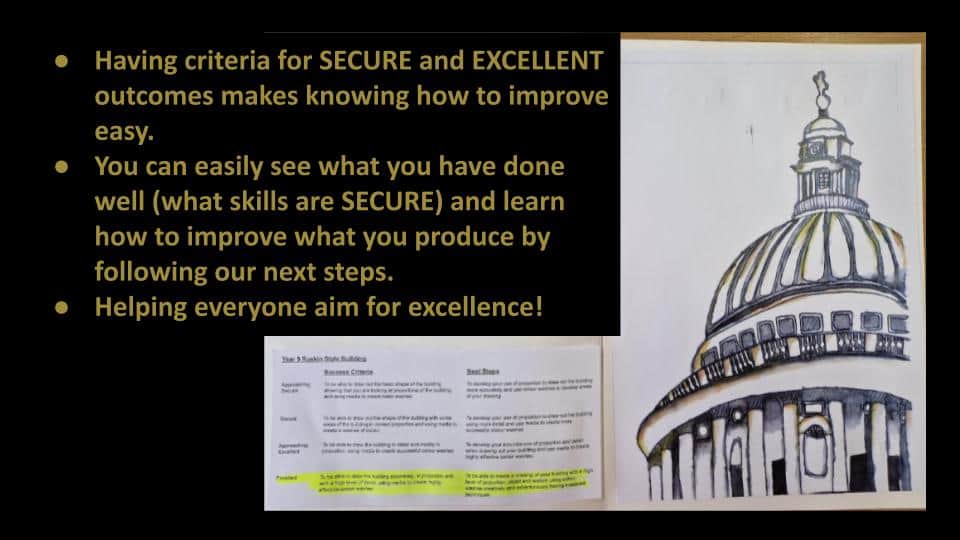
They can easily understand what they have done well and what their next steps are in order to do even better.
You can learn more about how we talk with our students about assessment at Key Stage Three by viewing this example slideshow used by our Art Department.
KS3 Academic Reports
Academic Reports are issued twice each academic year in Years 7, 8 and 9. They help monitor the academic progress that a student is making in every subject. Based on all available information, teachers will use this to judge a student’s current standard of work and provide a broad description of the progress they are making. Students will be given a grade that is either ‘Approaching Secure’, ‘Secure’, ‘Approaching Excellent’ or ‘Excellent’. These descriptors can be used to provide an early, albeit tentative, indication of potential GCSE outcomes; we wish to avoid any suggestion that there are artificial limits on a child’s potential. If a teacher feels that one of their students is not on course to be successful, then they will request contact with their family to discuss possible solutions and strategies to secure those improvements. Where there are concerns across a range of subjects then contact will also be made by the respective head of year to examine why the student appears to be struggling more generally, rather than in one or two particular subjects.
KS4 Academic Reports
Academic Reports are issued twice each academic year in Years 10 and 11. They help monitor the academic progress that a student is making in every subject. On these reports you will see a personal target grade for each subject, which has been derived using the Fisher Family Trust 20 (FFT20) benchmark, calculated from KS2 data where this is available. If a student secures this target grade, then he or she will have secured a degree of progress (between Years 6 and 11) that equates to the 20% most successful students in the country.
- In Year 10, teachers use their professional judgment to generate a GCSE grade ‘range’ for each student that identifies the range of grades they are most likely to secure, based on their current standard of work. If their forecast falls below their FFT20 personal target grade, then the subject teacher will request contact with their family to discuss possible solutions and strategies to secure those improvements. Where there are concerns across a range of subjects then contact will also be made by the respective head of year to examine why the student appears to be struggling more generally, rather than in one or two particular subjects.
- In Year 11, the information is more detailed, and we introduce ‘fine grades’ instead of grade ranges. The first Academic Report (issued after the autumn term mocks) will include a range of information from each teacher: the mock exam grade, the ‘most likely’ grade and a ‘capable of’ grade. Similarly, teachers and the head of year will make contact where concerns exist.
Here is an example of a KS4 Academic Report
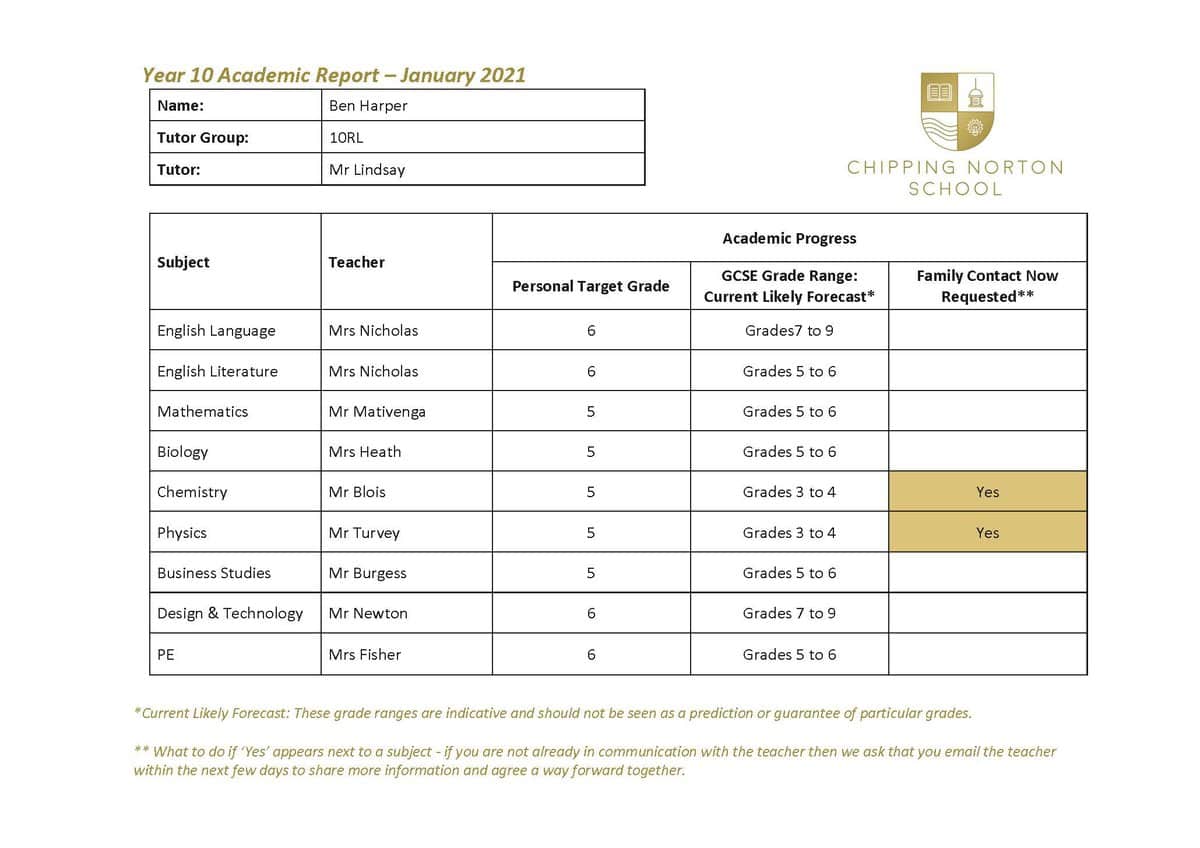
In this fictitious example, Ben’s current rate of progress indicates that the likely GCSE grade range falls below his personal target grade in both chemistry and physics. Mr Blois and Mr Turvey have indicated family contact is needed. This will enable supportive conversations to take place.
In this fictitious example, Ben’s current rate of progress indicates that the likely GCSE grade range falls below his personal target grade in both chemistry and physics. Mr Blois and Mr Turvey have indicated family contact is needed. This will enable supportive conversations to take place.
KS5 Academic and Standards Reports
Academic Reports are issued twice each academic year in Years 12 and 13. They help monitor the academic progress that a student is making in every subject, in addition to assessing their attitudes to learning. On these reports your subject teachers will indicate whether they have any concerns about the standard of classwork or homework that each student is producing. We avoid minor problems becoming major problems by introducing supportive ‘study contracts’ when a student is at risk of falling behind. This involves Mr Ward and Mrs Davison discussing solutions with the student, their parent or carers and individual teachers. Target grades in every A Level subject are generated using ‘ALPS’. This uses each student’s GCSE performance to generate ambitious but achievable targets. Teachers will also be able to forecast each student’s ‘most likely’ final grade with greater levels of certainty as the A level courses progress.
Here is an example of a KS5 Academic Report

In this fictitious example, Daniel is exceeding his target grade in English, meeting his target in psychology, and is failing to meet his target in biology. Mrs Heath, his biology teacher, has raised concerns on this report. The sixth form team will talk to Daniel about his work in biology and will contact home to discuss appropriate intervention strategies to help Daniel become more successful in Biology.
In this fictitious example, Daniel is exceeding his target grade in English, meeting his target in psychology, and is failing to meet his target in biology. Mrs Heath, his biology teacher, has raised concerns on this report. The sixth form team will talk to Daniel about his work in biology and will contact home to discuss appropriate intervention strategies to help Daniel become more successful in Biology.


